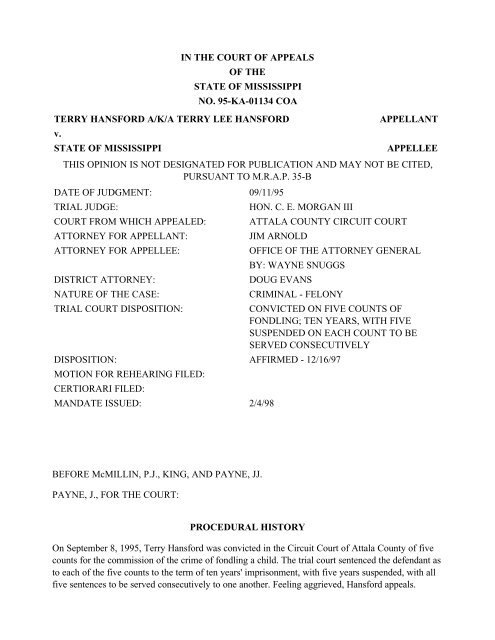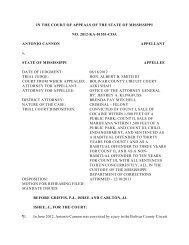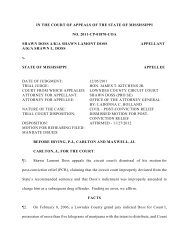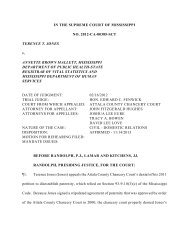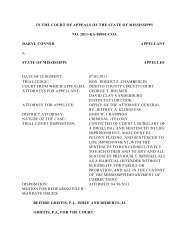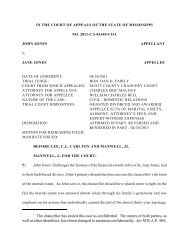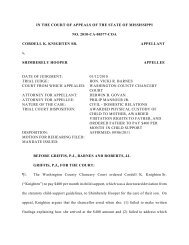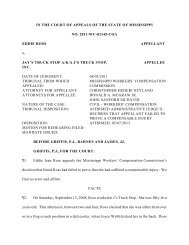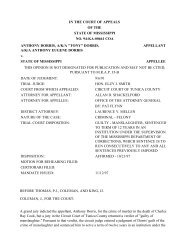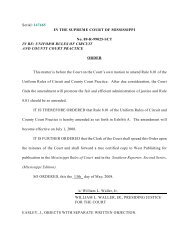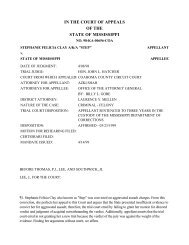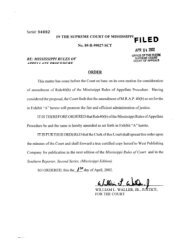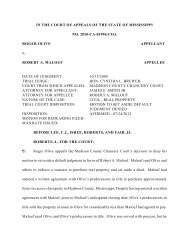95-KA-01134 COA - Mississippi Supreme Court
95-KA-01134 COA - Mississippi Supreme Court
95-KA-01134 COA - Mississippi Supreme Court
Create successful ePaper yourself
Turn your PDF publications into a flip-book with our unique Google optimized e-Paper software.
IN THE COURT OF APPEALS<br />
OF THE<br />
STATE OF MISSISSIPPI<br />
NO. <strong>95</strong>-<strong>KA</strong>-<strong>01134</strong> <strong>COA</strong><br />
TERRY HANSFORD A/K/A TERRY LEE HANSFORD<br />
v.<br />
STATE OF MISSISSIPPI<br />
APPELLANT<br />
APPELLEE<br />
THIS OPINION IS NOT DESIGNATED FOR PUBLICATION AND MAY NOT BE CITED,<br />
PURSUANT TO M.R.A.P. 35-B<br />
DATE OF JUDGMENT: 09/11/<strong>95</strong><br />
TRIAL JUDGE:<br />
COURT FROM WHICH APPEALED:<br />
ATTORNEY FOR APPELLANT:<br />
ATTORNEY FOR APPELLEE:<br />
DISTRICT ATTORNEY:<br />
NATURE OF THE CASE:<br />
TRIAL COURT DISPOSITION:<br />
HON. C. E. MORGAN III<br />
ATTALA COUNTY CIRCUIT COURT<br />
JIM ARNOLD<br />
OFFICE OF THE ATTORNEY GENERAL<br />
BY: WAYNE SNUGGS<br />
DOUG EVANS<br />
CRIMINAL - FELONY<br />
CONVICTED ON FIVE COUNTS OF<br />
FONDLING; TEN YEARS, WITH FIVE<br />
SUSPENDED ON EACH COUNT TO BE<br />
SERVED CONSECUTIVELY<br />
DISPOSITION: AFFIRMED - 12/16/97<br />
MOTION FOR REHEARING FILED:<br />
CERTIORARI FILED:<br />
MANDATE ISSUED: 2/4/98<br />
BEFORE McMILLIN, P.J., KING, AND PAYNE, JJ.<br />
PAYNE, J., FOR THE COURT:<br />
PROCEDURAL HISTORY<br />
On September 8, 19<strong>95</strong>, Terry Hansford was convicted in the Circuit <strong>Court</strong> of Attala County of five<br />
counts for the commission of the crime of fondling a child. The trial court sentenced the defendant as<br />
to each of the five counts to the term of ten years' imprisonment, with five years suspended, with all<br />
five sentences to be served consecutively to one another. Feeling aggrieved, Hansford appeals.
FACTS<br />
M.M. was born on May 10, 1988. At the time of the trial she was seven years old. The trial court<br />
ruled that she was qualified to testify before the jury. M.M. called her assailant "Papaw Terry." She<br />
testified that her grandfather sexually assaulted her on several occasions. On cross-examination,<br />
M.M. testified that she first told her mother about what had transpired after listening to her mother<br />
read from the Bible. Also, she testified that her mother observed both her and another young child<br />
committing a sexual act. After that, both M.M. and her mother visited the police department.<br />
Testifying as a counselor, Dr. Paul Davey stated that M.M. had identified Terry and Randy<br />
Handsford as the perpetrators of crimes against her. He testified that he had interviewed M.M.<br />
numerous times. It was his belief that she had not been coached. Concomitant with the testimony of<br />
Dr. Davey, Mildred McClellan, a social worker, testified that soon after the abuse was reported to<br />
the police, M.M. told her that "granddaddy" had sexually abused her.<br />
Contrary to the State's assertion, Terry alleges that he would be incapable of picking the young child<br />
up from her pallet. He noted during the course of his testimony that he had four slipped discs and that<br />
his physical condition was degenerative. Likewise, he asserts that M.M. was presented to Dr. Edward<br />
Bryant, for a medical examination in January 19<strong>95</strong>, and that Dr. Bryant could find no evidence of<br />
vaginal or rectal penetration, trauma, bruising, tearing or stretch marks. However, Dr. Bryant noted<br />
that he would not expect to find evidence of rectal penetration had the penetration been minor.<br />
Furthermore, Terry asserts that the State's case rested on the testimony of a minor. Several witnesses<br />
testified on behalf of the accused: his wife and his son. His wife stated that were she to believe the<br />
child fondling accusations made by her grandaughter, she would have left her husband. She presently<br />
lives with him.<br />
ARGUMENT AND DISCUSSION OF LAW<br />
ANALYSIS OF ISSUES PRESENTED<br />
The defendant lists twelve points as error on this his appeal. This <strong>Court</strong> will consolidate several<br />
issues, and will not address others as those are procedurally barred.<br />
I. WHETHER THE CIRCUIT COURT ERRED IN ALLOWING, OVER DEFENDANT'S<br />
OBJECTION, THE STATE OF MISSISSIPPI'S AMENDMENT OF THE INDICTMENT AS<br />
THE AMENDMENT DEFEATED DEFENDANT'S ALIBI DEFENSE.<br />
II. WHETHER THE CIRCUIT COURT ERRED IN ALLOWING THE STATE OF<br />
MISSISSIPPI OVER THE DEFENDANT'S OBJECTION, TO AMEND ITS FIVE COUNT<br />
INDICTMENT.<br />
The defendant submits that the court erred in permitting the amendment of the indictment when such<br />
an amendment destroyed the defendant's defense of alibi. The <strong>Mississippi</strong> <strong>Supreme</strong> <strong>Court</strong> in, Shelby<br />
v. State 246 So. 2d 543, 545 (Miss. 1971) stated:
It is well settled in this state, as was noted by the learned circuit judge, that a change in the indictment<br />
is permissible if it does not materially alter facts which are the essence of the offense on the face of the<br />
indictment as it originally stood or materially alter a defense to the indictment as it originally stood so<br />
as to prejudice the defendant's case.<br />
Byrd v. State, 228 So. 2d 874, 875-76 (Miss. 1969) sets forth the standard by which an amendment<br />
to an indictment is measured to determine prejudice to the defendant and stated:<br />
The test of whether an accused is prejudiced by the amendment of an indictment or information has<br />
been said to be whether or not a defense under the indictment or information as it originally stood<br />
would be equally available after the amendment is made and whether or not any evidence [the] accused<br />
might have [sic]would be equally applicable to the indictment or information in the one form as in the<br />
other; if the answer is in the affirmative, the amendment is one of form and not substance.<br />
The record indicates that the defendant's alibi was not a defense at the time the trial judge ruled on<br />
the indictment. The defendant was simply not prejudiced as he claims. Coupled with this fact, a<br />
motion was discussed and ruled on prior to the commencement of the trial. There was no objection to<br />
this ruling, and the defense counsel's understanding of the matter in preparing for trial was that the<br />
indictment was alleging that the acts of abuse occurred during the time periods set out in the various<br />
counts. (1) The defendant "knew what [he] was charged with." McCullum v. State, 487 So. 2d 1335,<br />
1338 (Miss. 1986). While it is true that in some circumstances the inability to present an alibi defense<br />
can satisfy the requirment of showing prejudice, a mere allegation of prejudice, such as the defendant<br />
has made in the trial court and repeats here, is not a showing of prejudice. We find the defendant's<br />
first and second assignment of error to be without merit.<br />
III. WHETHER THE CIRCUIT COURT ERRED IN SENTENCING THE DEFENDANT TO<br />
A TERM OF TWENTY-FIVE YEARS.<br />
The defendant suggests to this <strong>Court</strong> that the twenty-five years sentence for lustful touching is<br />
tantamount to a capital offense. However, we find that the sentence was within the guidelines set out<br />
in the statute. Hansford was convicted of five violations of Section 97-5-23 (1) of the Miss. Code<br />
Ann. (Rev. 1993) and faced a maximum combined sentence of fifty years imprisonment and $5,000 in<br />
fines. The trial court sentenced him to the maximum term of imprisonment for each count but<br />
suspended five years of each ten years sentence, so that the effective sentence is five consecutive five<br />
year terms, or a total of twenty-five years imprisonment.<br />
The sentence imposed by the trial court is within the statutory limits, and the appellant has shown no<br />
error. Fleming v. State, 604 So. 2d 280, 302 (Miss. 1992); Medley v. State, 600 So. 2d <strong>95</strong>7, 962<br />
(Miss. 1992). We find the defendant's third assignment of error to be without merit.<br />
IV. WHETHER THE CIRCUIT COURT ERRED IN OVERRULING DEFENDANT'S<br />
MOTION TO DISMISS THE STATE'S INDICTMENT AND DEFENDANT'S MOTION TO<br />
DISMISS FOR PREJUDICIAL JOINDER.
<strong>Mississippi</strong> Code Annotated § 99-7-2 (Rev. 1994) states:<br />
(1) Two (2) or more offenses which are triable in the same court may be charged in the same<br />
indictment with a separate count for each offense if: (a) the offenses are based on the same act or<br />
transaction; or (b) the offenses are based on two (2) or more acts or transactions connected together<br />
or constituting parts of a common scheme or plan.<br />
In the case before us, the defendant was indicted on each count for fondling the same child. We find<br />
the offenses in question are related as the same type of act. The defendant cites no relevant authority<br />
in support of his argument and makes only a cursory note of his objection by employing Gray v.<br />
State, 549 So. 2d 1316 (Miss. 1989). Gray involved a multi-count indictment where the defendant<br />
was charged in count one with making an annoying phone call and counts two through eight with<br />
making seven phone calls to another victim on another date. The <strong>Mississippi</strong> <strong>Supreme</strong> <strong>Court</strong> held that<br />
count one had been misjoined with counts two through eight because count one was not based upon<br />
the same "act or transaction" as the other seven counts because the offenses involved were "separate<br />
and distinct acts, with different victims, different subject matter. . . ." Id. at 1321. As we have stated<br />
earlier, this case involves the same victim and the same subject matter and acts. We find the<br />
defendant's fourth assignment of error to be without merit.<br />
V. WHETHER THE CIRCUIT COURT ERRED IN OVERRULING DEFENDANT'S<br />
OBJECTION TO THE TESTIMONY OF M. M.<br />
Being responsive to the defendant, though his issues are inaccurately drawn, we find that M.M.'s<br />
testimony was not hearsay. We also find that the issue the defendant attempted to proffer was<br />
whether the testimony of the M.M.'s mother, and that of Dr. Paul Davey and Mildred McClellan, was<br />
correctly admitted. Thus, Hansford claims that the trial court erroneously admitted M.M.'s remarks<br />
to Donna M., Mildred McClellan, and Dr. Paul Davey. Citing Mitchell v. State, 539 So. 2d 1366<br />
(Miss. 1989) as authority, the appellant states that the child's hearsay statements should not have<br />
been allowed for the jury's consideration. According to the defendant, the State's entire case was built<br />
on nothing but a long chain of hearsay. In response, we find that the statements by this child victim fit<br />
squarely within M.R.E. 803(25), the tender years exception to the hearsay rule. M.R.E. 803 (25)<br />
provides an exception to the hearsay rule for:<br />
[a] statement made by a child of tender years describing any act of sexual contact performed with or<br />
on the child by another is admissible in evidence if: (a) the court finds, in a hearing conducted outside<br />
the presence of the jury, that the time, content, and circumstances of the statement provide substantial<br />
indicia of reliability; and (b) the child either (1) testifies at the proceedings; or (2) is unavailable as a<br />
witness: provided, that when the child is unavailable as a witness, such statement may be admitted only<br />
if there is corroborative evidence of the act.<br />
"The 'substantial indicia of reliability' required by the rule are necessary to prevent confrontation<br />
clause problems." Eakes v. State, 665 So. 2d 852, 864 (Miss. 19<strong>95</strong>) (quoting Doe v. Doe, 644 So.<br />
2d 1199, 1206 (Miss. 1994)). In that regard the ultimate inquiry is "whether the child declarant was
particularly likely to be telling the truth when the statement was made." Griffith v. State, 584 So. 2d<br />
383, 388 (Miss. 1991) (quoting Idaho v. Wright, 497 U.S. 805, 822 (1990)). The U.S. <strong>Supreme</strong><br />
<strong>Court</strong> expressly declined in Idaho v. Wright to adopt a "mechanical test." Wright, 497 U.S. at 822.<br />
However, the determination should be made on the record. M.R.E. 803(25) cmt. Furthermore, the<br />
trial court cannot consider other corroborating evidence of guilt. Griffith 584 So. 2d at 388 (citing<br />
Idaho v. Wright, 497 U.S. at 822). "To be admissible under the Confrontation Clause, hearsay<br />
evidence used to convict a defendant must possess indicia of reliability by virtue of its inherent<br />
trustworthiness, not be reference to other evidence at trial." Id.<br />
Pursuant to the rule, the trial judge conducted a hearing outside the presence of the jury and<br />
determined, based on the circumstances surrounding M.M.'s revelations, that the requisite reliability<br />
existed. In arriving at this conclusion, the trial judge considered the child's age, the child's constant<br />
interaction with the accused family (she is the accused's granddaughter), the child's planned testimony<br />
and accompanying availability for cross-examination. Based on these, he found it particularly likely<br />
that the child had been telling the truth. When the correct legal standard is employed by the trial<br />
court, as was done, we will reverse a finding of admissibility only when there has been an abuse of<br />
discretion. Doe, 644 So. 2d at 1207. After reviewing the record, we find none. M.M. overcame the<br />
embarrassment associated with molestation and described her ordeal, the best way she could, with no<br />
apparent motive other than to tell the truth. Since we find no fault in the trial court's determination<br />
that these statements had "particularized guarantees of trustworthiness," this facet of Hansford's<br />
contention is without merit. Though Hansford's hearsay arguments appear to be nothing more than<br />
errant torpedoes, we have discussed each and find that none contain merit.<br />
VIII. WHETHER THE CIRCUIT COURT ERRED IN OVERRULING DEFENDANT'S<br />
MOTION FOR A DIRECTED VERDICT BECAUSE THE STATE FAILED TO CONFIRM<br />
DEFINITE TIMES OR PLACES WHERE THE ALLEGED INCIDENTS WERE TO HAVE<br />
OCCURRED.<br />
When considering a motion for a directed verdict or a judgment notwithstanding the verdict this<br />
<strong>Court</strong> must consider all of the evidence in the light most favorable to the State, accepting all evidence<br />
introduced by the State as true, together with all reasonable inferences therefrom. Jones v. State, 606<br />
So. 2d 1051, 1060 (Miss 1992). The defendant states that the testimony of the minor was insufficient<br />
to establish a prima facie case against he defendant. However, the State produced sufficient evidence<br />
as to the places where the incidents occurred, mainly: while at Hansford's brick house, more<br />
particularly in Kevin's room; and in the living room, while at Handsford's wood house, more<br />
particularly in the washroom; in Randy's room and in a downstairs closet under the steps.<br />
While it is true that the State did not specify the particular dates, the State produced sufficient<br />
evidence that the acts as alleged, occurred in January/November of 1993 and thereafter until July of<br />
1994.<br />
Traditionally, time and place have been viewed as not requiring considerable specificity because they<br />
ordinarily do not involve proof of an element of [the] crime. The time allegation can refer to the event<br />
as having occurred "on or about" a certain date and within reasonable limits.
2 W. LaFave & J. Israel, Criminal Procedure, §19.2 (1984). We find the defendant's eighth<br />
assignment of error without merit.<br />
These issues are procedurally barred:<br />
VI. WHETHER THE CIRCUIT COURT ERRED IN OVERRULING DEFENDANT'S<br />
MOTION FOR A NEW TRIAL OR FOR A JUDGEMENT NOTHWITHSTANDING THE<br />
VERDICT OF THE JURY.<br />
VII. WHETHER THE CIRCUIT COURT ERRED IN OVERRULING THE DEFENDANT'S<br />
MOTION FOR A NEW TRIAL BASED UPON NEWLY DISCOVERED EVIDENCE.<br />
IX. WHETHER THE CIRCUIT COURT ERRED IN FAILING TO SUSTAIN THE<br />
DEFENDANT'S MOTION FOR DIRECTED VERDICT BASED UPON ITS FAILURE TO<br />
MEET THE BURDEN OF PROOF BASED UPON THE OVERWHELMING WEIGHT OF<br />
THE EVIDENCE.<br />
X. WHETHER THE CIRCUIT COURT ERRED IN OVERRULING THE DEFENDANT'S<br />
INSTRUCTIONS TO THE JURY BY SUSTAINING THE STATE'S INSTRUCTIONS SO4<br />
AND SO5.<br />
XI. WHETHER THE CIRCUIT COURT ERRED IN FAILING TO GRANT A NEW TRIAL<br />
AS THE VERDICT WAS AGAINST THE OVERWHELMING WEIGHT OF THE<br />
EVIDENCE, WHEN TESTIMONY OF MINOR WAS UNCORROBORATED BY MEDICAL<br />
TESTIMONY AND WAS BOLSTERED BY HEARSAY AND REPETITIOUS TESTIMONY<br />
OF MS. M., DHS EMPLOYEE, AND DR. PAUL DAVEY.<br />
XII. WHETHER TRIAL COUNSEL WAS DELETERIOUS AND POSSIBLY INEFFECTIVE<br />
BY FAILING TO SUBPEOENA THE DOCTORS WHO TREATED DEFENDANT FOR<br />
CANCER AND LUMBAR DISC DISEASE RESULTING IN DEFENDANT'S PERMANENT<br />
TOTAL DISABILITY FROM 1985 FORWARD.<br />
The defendant cites numerous errors of assignment but has failed to give this <strong>Court</strong> any indication as<br />
to what authority he relies on in asserting those errors, other than a mere statement, leaving this<br />
<strong>Court</strong> to try his case for him. Because these assignments of errors are not supported by authority,<br />
they are not properly before this <strong>Court</strong> on appeal, and therefore waived. Holloman v. State, 656 So.<br />
2d 1134, 1141 (Miss. 19<strong>95</strong>); Jackson v. State, 672 So. 2d 468, 478 (Miss. 1996).<br />
II. CONCLUSION<br />
Considering all of the evidence of this case in the light most favorable to the verdict and no
prejudicial violation toward the defendant, we uphold the verdict below. The trial court did not err.<br />
THE JUDGMENT OF THE CIRCUIT COURT OF ATTALA COUNTY OF CONVICTION<br />
OF FIVE COUNTS OF TOUCHING A CHILD FOR LUSTFUL PURPOSES AND<br />
SENTENCE ON EACH COUNT OF TEN YEARS WITH FIVE YEARS SUSPENDED TO<br />
RUN CONSECUTIVELY AND CONSECUTIVE TO ANY PREVIOUSLY IMPOSED<br />
SENTENCE IN THE CUSTODY OF THE MISSISSIPPI DEPARTMENT OF<br />
CORRECTIONS IS AFFIRMED. ALL COSTS OF THIS APPEAL ARE TAXED TO ATTALA<br />
COUNTY.<br />
BRIDGES, C.J., McMILLIN AND THOMAS, P.JJ., COLEMAN, DIAZ, HERRING,<br />
HINKEBEIN, KING, AND SOUTHWICK, JJ., CONCUR.<br />
1. The State amended the five count indictment so as to allege that the criminal acts occurred<br />
"between" rather than "on or about" the dates set out in each count.


